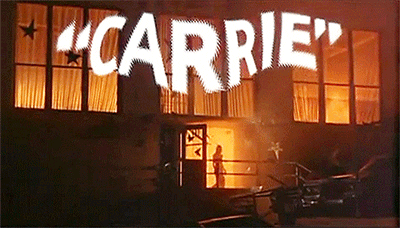You're A Woman Now: Womanhood in "Carrie" (1976)
Stephen King’s famous novel, “Carrie”, was adapted to a film
in 1976 and is, in my humble opinion, one of the best horror movies to ever be
produced. It tackles some very important issues, from bullying to religious
extremism, but none are as prevalent as the theme of womanhood within the film.
The work features a high school senior named Carrie who will
resonate with people of the same age while also speaking to older audience
members. The movie takes a left-of-center approach to womanhood, forcing the
audience to ask why society allows womanhood to be suppressed and deemed as reproachable
and, in some cases, even evil.
The first scene of the film immediately tackles the issue of
womanhood and introduces how Carrie has been raised to deal with it – she hasn’t.
The movie shows that, when Carrie gets her first period, she doesn’t know what’s
going on and she is instantly ridiculed for it. In fact, that moment is what
sets the tone for the rest of the film: Carrie is trying to become a woman but
is suppressed by other characters, whether it be her own mother or her fellow
students.
The scenes with her mother often exemplify this best,
especially when looking at the scene where Carrie asks her “Why didn’t you tell
me, Mama?”
Her mother responds with the doctrines she has force-fed
Carrie since Carrie was young: woman are inherently evil. Carrie’s mother
attributes the period to Carrie’s lust (though Carrie has not shown any signs
of sexual desire at all – not even a crush on a boy) and abuses her as a
result.
She forces Carrie to quote from the book she beats Carrie
with: “And the first sin was intercourse.” Thus we see just why Carrie’s mother
is so concerned about lust: lust leads to sex and sex is the first and greatest
sin and this sin was caused by a
woman. Therefore, since sin is bad, women are bad.
The film obviously tries to push against this toxic rhetoric
as we see Carrie grow until the end of the film. On prom night, Carrie finally
embraces her womanhood by buying a dress and going to the prom. She pushes past
her mother’s abuse as she is told to hide her “dirty pillows.” Carrie responds,
embracing herself and her femininity by claiming “They’re called breasts and
every woman has them.”
With this final embrace of her sovereignty over herself and
her womanhood, Carrie goes to the prom and is even elected Prom Queen. Of
course, as I’m sure we all know, the bullies hate that Carrie has embraced
womanhood in the way that she has and pull a “prank” that sends the psychokinetic
teen into a final rage in which she burns down the whole school and everyone in
it.
In other words, the moral of the story is: Let women embrace
their femininity, womanhood, and sexuality in the way they want to or need to.
In Carrie’s case, if she had been taught about her reproductive organs and how
they would function, she’d have been spared a lot of humiliation.
Similarly, if
the students who made fun of her had been taught and raised to be kind rather
than cruel (and followed those teachings,) Carrie wouldn’t have been under the
pressure she was under.
I think that, ultimately, the target audience will pick up
the general message of this film: don’t bully others to conform to your ideas of
womanhood or identity. “Carrie” is a beautiful example of this, demonstrating a strong, sympathetic female character and passing the Bechdel test with flying colors (years before the test became a thing) and its message
can be used to teach people even today that womanhood and women should not be suppressed.



Comments
Post a Comment